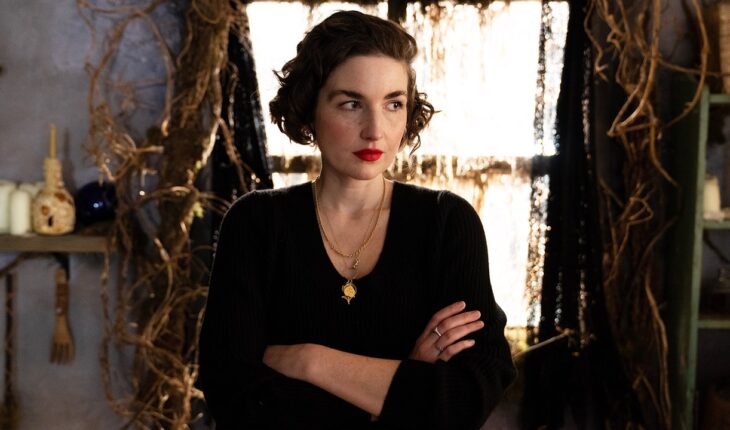This feature references suicide.
Director Elizabeth Sankey was hospitalised after giving birth to her son, spending eight weeks in a psychiatric ward due to postpartum mental illness. After being discharged, she desperately wanted to learn more about what had happened to her, and during her research, she soon found “interesting links” between perinatal mental health problems and the role of women in medicine and the witch trials, and how women were and are stigmatised and shamed by all three. This birthed her latest documentary, Witches.
Elizabeth has chronicled the female experience through documentaries previously, diving deep into our love of romcoms in 2019’s Romantic Comedy and 2022’s Boobs, which looks at women’s relationships with their breasts as well as social pressures put on how we feel about them.
Witches, though, is an ode to women who don’t conform, as well as a rallying cry for better medical and social understanding of postpartum mental health, from depression and anxiety to psychosis. Peppered with witchy pop culture references, from Wicked to The Witches of Eastwick – it questions why certain “witches” were isolated and stigmatised, and how channelling their outlook might actually be the rebellion against – and liberation from – society’s values that we all need, a rejection of the mainstream ideas around both femininity and motherhood.
Elizabeth interviews women she met during her time on the ward, as well as a perinatal psychologist and historian, about their experiences and research, as well as how witchcraft and the social attitudes around persecuted and isolated women tie in with the story of postpartum mental illness.
It’s an issue that needs more airtime, especially seeing as suicide is a leading cause of maternal death in the UK, and the rates are increasing. GLAMOUR sat down with Elizabeth to talk about her hopes for her documentary being a “spell book” for parents navigating the same waters that she did.
What made you want to make the documentary?
When I was ill, I was in this support group for new mothers called Motherly Love, which had been such a turning point for me in terms of my care, because it was these women who when I said ‘I’m having these thoughts, I’m having these feelings’, they immediately were like, ‘Oh yeah, I’ve had that. It’s awful, isn’t it?’ And it normalised all those intrusive thoughts, and really made me feel like I wasn’t alone.
When I was released from the ward, I really wanted to make something about [the experience] for myself, to heal myself but also to continue to – I hate this term – pay it forward, to give other women that space. We really saw the film as a spell book that we hoped that women would share if it connected with them, and they’d have it as a resource.
MUBI






